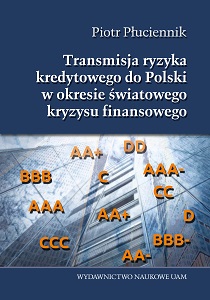Transmisja ryzyka kredytowego do Polski w okresie światowego kryzysu finansowego
Credit Risk Transfer to Poland During the Global Financial Crisis
Author(s): Piotr Płuciennik
Subject(s): Economy, Supranational / Global Economy, Financial Markets
Published by: Wydawnictwo Naukowe Uniwersytetu Adama Mickiewicza
Keywords: bond spread; credit default swap; swap spread; LIBOR-OIS spread; Switching models; copula-GARCH models; World Financial Crisis; multivariate GARCH models
Summary/Abstract: Poland was a country relatively unscathed by the global financial crisis that began in 2007. Polish banks were not involved in the market for securities linked to U.S. subprime loans, and exports' relatively small share in GDP meant that the slowdown in the global economy did not impact the Polish economy significantly. During the period under consideration, Poland's debt was relatively small compared to the countries of southern Europe, and its positive economic growth rate made it possible to avoid radical cuts in budget expenditure. In spite of this, the effects of the crisis were felt particularly strongly by the banking sector and the bond market. The research described in the monograph serves the understanding of the crisis' consequences for the Polish banking sector and the mechanism through which it was transmitted to the Polish interbank market, as well as to assess the central bank's ability to implement monetary policy during the crisis. It also examines the causes of an increase in the risk premium of Polish bonds and assesses the bonds whose countries had the greatest impact on shaping this risk.
- E-ISBN-13: 978-83-232-3868-3
- Print-ISBN-13: 978-83-232-3867-6
- Page Count: 251
- Publication Year: 2021
- Language: Polish
- eBook-PDF
- Table of Content
- Introduction

